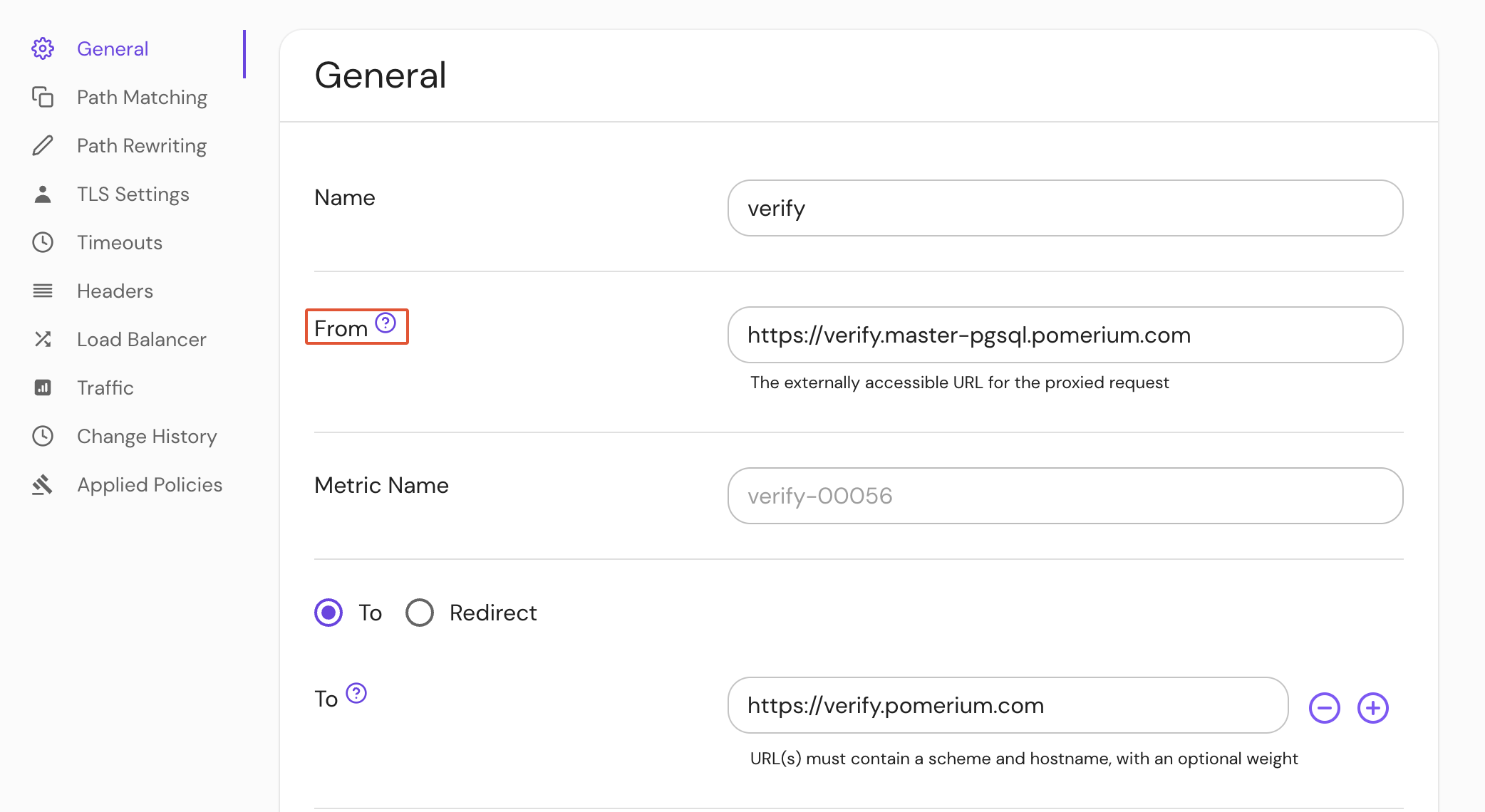From
Summary
The From URL is the externally accessible URL for a proxied HTTP request.
Specifying tcp+https or udp+https for the scheme enables TCP proxying or UDP proxying (available since v0.29) support for the route. You may map more than one port through the same hostname by specifying a different :port in the URL.
Specifying ssh for the scheme enables native SSH proxying.
How to Configure
The from URL must contain a scheme and hostname. It can't contain a path. When defining a From URL, you must use https, tcp+https, udp+https, or ssh. Pomerium only supports secure schemes.
Port Matching Behavior
In v0.26, we've updated the route matching behavior. If you do not specify a port number in a route's From URL, the route will match incoming requests with any port number (or no port number). If you do specify a port number, that route will match only requests containing that specific port number.
With a from URL like the one below:
from: https://www.example.com
Pomerium will match incoming requests on any port:
https://www.example.com
https://www.example.com:443
https://www.example.com:8443
https://www.example.com:3000
If you specify the port in the From URL, Pomerium will only match incoming requests that specify this port:
from: https://www.example.com:8443
Previously Pomerium would require an exact match between the incoming request and the From URL port number.
You can revert to the previous behavior by setting the match_any_incoming_port runtime flag to false.
- Core
- Enterprise
- Kubernetes
- Enterprise via Terraform
| YAML/JSON setting | Type | Schemes | Usage |
|---|---|---|---|
from | URL | https, tcp+https, udp+https, ssh | required |
Examples
routes:
- from: https://verify.corp.example.com
to: https://example.com
# Native SSH Access
- from: ssh://ssh.corp.example.com:22
to: ssh://ssh.local:22
# TCP tunneling
- from: tcp+https://ssh.corp.example.com:22
to: tcp://ssh.local:22
# UDP
- from: udp+https://time.corp.example.com:13
to: udp://time.local:13
Define a From route under General route settings in the Console:

See Kubernetes Ingress for more information.
| Parameter name | Type | Usage |
|---|---|---|
from | String | required |
Examples
resource "pomerium_route" "verify_route" {
name = "verify-route"
namespace_id = pomerium_namespace.test_namespace.id
from = "https://verify.localhost.pomerium.io"
to = ["https://verify.pomerium.com"]
}
See Routing - Route matching order for more information on how Pomerium processes and matches routes.
Wildcard From Routes
Kubernetes: Wildcard From Routes in Kubernetes are unofficially supported because Pomerium's implementation behaves differently than what Kubernetes defines in their documentation. See Wildcard Hostnames for more information.
Wildcard From Routes supports the use of a wildcard asterisk (*) placed anywhere within the domain name portion of a from URL.
Defining a from route with * will point any matching routes to the defined To route. This eliminates the need to define multiple near-identical routes in your configuration. (Autocert will be disabled for hosts that use Wildcard From Routes.)
For example:
# Before:
routes:
- from: https://a.example.com
to: https://example.com
- from: https://b.example.com
to: https://example.com
- from: https://c.example.com
to: https://example.com
- from: https://d.example.com
to: https://example.com
- from: https://e.example.com
to: https://example.com
# After
routes:
- from: https://*.example.com
to: https://example.com
# Or
routes:
- from: tcp+https://*.example.com:22
to: tcp://example.com:22
Wildcard Processing Behavior
Pomerium processes routes in the order they are defined in the configuration file. However, routes which don't contain wildcards (*) may take precedence over routes which do contain wildcards.
For example, given the routes below, if you send a request to foo.example.com, Pomerium would redirect the request to 1.example.com.
If you send a request to bar.example.com (a non-wildcard route), Pomerium would redirect the request to 2.example.com.
routes:
- from: https://*.example.com
to: http://1.example.com
- from: https://bar.example.com
to: http://2.example.com